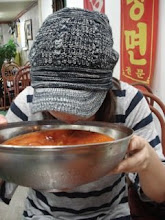I wasn't much of a texter in the States, as I didn't have a data plan nor felt the need to upgrade to one. (I enjoyed my month-to-month billing too much to get stuck in another contract, thank you very much!) Besides, not many of my friends were really into texting anyway (or perhaps I was unknowingly excluded from the club). I like to think they were traditionalists - you know, the people who actually used a cell phone to make a phone call? And surely, if anything short, witty, and random had to be said, there was always MySpace or Facebook.
In London, I definitely texted and limited outgoing calls like it was my job. (I kid.) "Topping up" on a prepaid phone in the UK wasn't very fun at two dollars to the pound.
In Korea, I've finally come to appreciate the art of text messaging, although I'm sure I've got a long way ahead of me. A few great things about texting in Hangul, as opposed to English, are that:
- You can say a lot more in a lot less space!
- It's faster!
- You can skimp on the spacing!
Here's my brief 60 second analysis. Ready?
1. You can say a lot more in a lot less space. This is especially useful for those who skillfully avoid turning an SMS into an MMS. Speaking of which, what exactly is the $ difference between the two, and other than having to wait for an MMS to download (I've noticed it can be a little slow at times), are there any other reasons people would rather send 2-3 SMS messages rather a long MMS?
Anyway, let's say you want to apologize to a friend and inform him/her that you might be running a few minutes late.
Sorry, it seems like I'll be a little late (42 characters, including spaces)
vs.
미안한데 좀 늦을 것 같아. (14 characters, including spaces)
Ok, maybe that's a bit unfair. I suppose that if we really wanted to, we might cut it down to this:
Sorry will be a little late (27 characters)
Sorry will be lil late (22 characters)
Sorry will b lil l8 (19 characters)
Numbers! We had to resort to numbers and it was
still longer in English. I suppose you could get even more creative, but not without significant butchering (or a bit of thinking, trying to come up with shorter ways to get the main (similar, but not same) point across: i.e. "Sorry runnin l8!") You get the point.
2. It's faster. Well, for me anyway. ^^ But that's because my thumbs aren't fully trained English-mobile-keypad-style.
3. You can skimp on the spacing.Let's take the same sentences and get rid of the spacing.
Sorrywillbealittlelate
Sorrywillbelillate
Sorrywillblill8
미안한데좀늦을것같아
In this case, it's easier to decipher the Korean upon first glance than the English, plus we haven't sacrificed any spelling or grammar. ^^ S'pose we could capitalize the first letter of each word to make it clearer, but that requires shifting from capital letter mode to lowercase letter mode, which means going through the 가 - a - A - 특 - 1 keys on a Korean phone multiple times - quite an effort for lazy fingers if you ask me.
However... there is a downfall!
My convenient, non-spaced text messaging habits have resulted in a bit of laziness, when it comes to recognizing how to properly space Korean words. Unfortunately, there's a little more to it than simply adding one after each word.
I recently came across
this blogger's post, which lists some common misunderstandings that can occur because of spacing. For example:
오늘밤 나무 사왔어.
I bought a tree tonight.
오늘밤 나 무 사왔어.
I bought radish tonight.
오늘 밤나무 사왔어.
I bought a chestnut tree today.
Thankfully, my spacing problems aren't quite that dramatic... it's more of a 앉아있다 vs. 앉아 있다 thing (which for the record, is correct both ways apparently).
But no worries, Naver is here to save the day with their
trusty Beta autospacer!But it begs the question... Is this a problem for Koreans as well? Why else would Naver develop an autospacer? Does Google have one cooking up in their labs as too? Probably, but I'm assuming it's for code, not plain English. ^^






















































